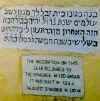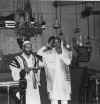|
|
||||
| Home
Society & Culture Traditional
Cultures
'Spirit of India' Jews
of India Technology Feature Technology
Investments
Films
|
|
|
||
|
the-south-asian.com March 2001 |
||||
|
Page 4 of 6
by Aharon Daniel
The Jews of India are not one singular community. Among themselves they
are divided into different communities. Each community has its own culture,
background and origin. Each community claims its arrival in India in
different ways and it is not always clear how they really came to India. The
three main Jewish communities of India are: Bene Israel who believe
themselves to be the descendants of the original settlers who came to India
as early as 2,000 years ago; Cochin Jews of southern India, who were centred
in Kerala; and the Iraqi Jews, called Baghdadis, who began settling in India
at the end of the 18th century, mainly in Bombay and Calcutta (Kolkata).
There were Ashkenazi Jews and also a community in Manipur, east India, which
claims Israeli origin – speculated to be one of the lost tribes - and call
themselves Bne Menashe. Each group has active synagogues. Bene Israel The Bene Israel ("Sons of Israel") claim to be descendants of Jews who escaped persecution in Galilee in the 2nd century BCE. They settled down primarily in Bombay, Calcutta, Old Delhi, and Ahmedabad and their native language became Marathi. The Bene Israel seem in appearance like the non-Jewish Maratha people, which indicates intermarriage between Jews and Indians. However, the Bene Israel maintained the practices and rituals of Judaism.The ancestors of Bene Israel were oil pressers in Galilee, who fled on a ship towards India. Close to the Indian coast their ship got wrecked but some survived the shipwreck – the present day Bene Israel are the descendants of those survivors, who swam towards the land and arrived at a village called Navgaon, where they buried the bodies of those who died in the shipwreck. There is a memorial in Navgaon to those who did not make it to the Indian shore. The survivors settled in the village and started working in agriculture and subsequently in oil producing, which later became their main profession. They were distinguished from other caste telis (oil pressers) and called Shanivari telis, because of their observation of Sabbath on Saturdays (Shanivar). The Bene Israel community grew and became a guild of oil pressers. They left their first village, Navgaon, and dispersed to other villages and towns along the coast of Konkan, becoming the oil producers and oil pressers of their respective villages. Gradually they derived their surnames from the villages they settled down in - Rohekar; Penkar; Palkar; Ashtamkar originated from the villages of Roha, Pen, Pali or Ashtam respectively.In the early 17th century, the Bene Israel came in contact with Jews from Cochin who brought them into the mainstream of modern Judaism.The Bene Israel began to move to Bombay in the late 18th century and built their first synagogue, Shaare Rahamim [Gates of Mercy], in 1796. In time, the Bene Israel in Bombay became, demographically, a strong community. In the early 19th century, the Bene Israel numbered approximately 6,000, by 1948 their numbers had grown to 30,000 – today there are only about 5000 in India – the majority having emigrated to Israel and some to Australia and England. Many of its members were employed in government service, and a considerable number of others distinguished themselves as officers in the Indian army. In the 1950's and 1960's, when the majority of Indian Jews immigrated to Israel, a significant number of the Bene Israel remained in India. Among the well-known members of this community in modern day Mumbai is the poet Nissim Ezekiel.
|
||||
| Copyright © 2000 [the-south-asian.com]. Intellectual Property. All rights reserved. | ||||
| Home |

